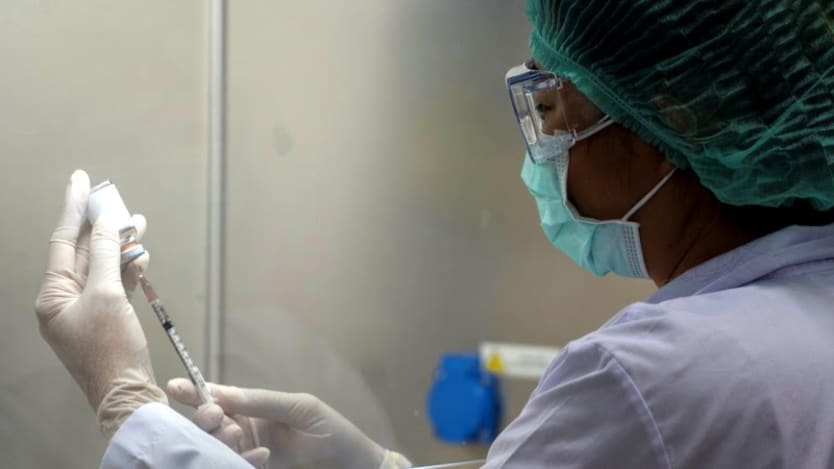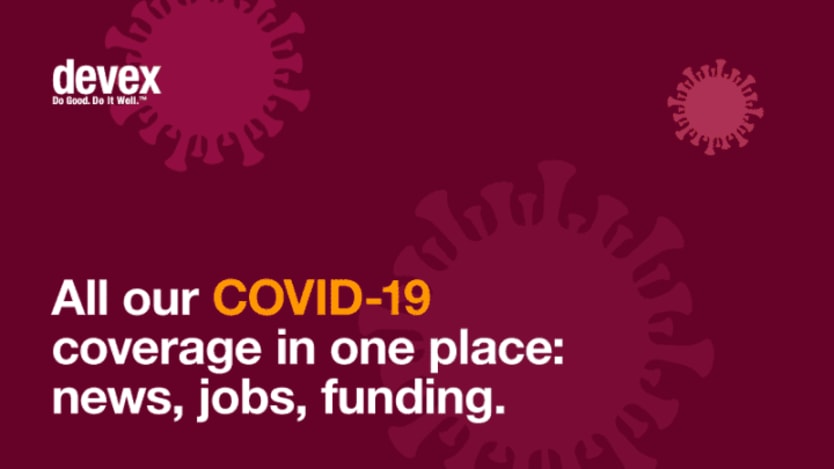
BERLIN — With potential vaccines racing through the development pipeline at dizzying speeds and existing drugs showing promise as possible treatments for COVID-19, pressure is mounting to ensure all countries have affordable access to any therapeutics or vaccines that eventually emerge.
Making a vaccine accessible: A glossary of terms
From patents to pooling, Devex explains the key terms in the jargon-heavy debate over vaccine access.
That is far from guaranteed. The pharmaceutical companies guiding much of this research will be looking to profit from their discoveries, and a global patenting system that grants them up to 20 years of exclusivity on making, selling, and licensing their invention means they could set prices out of reach for lower-income countries.
The responsibility for ensuring that lower-income countries have access to these drugs and diagnostics is often conceptualized as depending on richer countries and multilateral institutions — either to push for lower prices or to offset costs for the least-developed countries.
But governments of lower- and middle-income countries also have tools they can use to secure affordable access for their citizens, particularly under international trade agreements that allow them to override pharmaceutical patents.
Taking advantage of these can require a time-consuming process of passing legislation and setting up regulatory mechanisms — steps some governments are already taking.
Activists are calling for more attention to these efforts, putting pressure on lagging governments to act now so they will be able to immediately benefit from any advances in treating or preventing COVID-19.
“There is a possibility that if governments don’t act and take steps now, that access to medicines may be limited for the wealthy few,” said Zain Rizvi, a law and policy researcher at Public Citizen.
In 2001 — at the height of the AIDS crisis and under pressure from governments whose citizens were dying because they could not afford life-saving medicines — the World Trade Organization waded into the battle between intellectual property and public health. The resulting Doha Declaration ruled that the Agreement on Trade-Related Aspects of Intellectual Property Rights “should not prevent members from taking measures to protect public health.”
It confirmed that governments retained several mechanisms for guaranteeing affordable access to medicines, including issuing compulsory licenses, which allow them to use an invention without the patent holder’s consent in extraordinary circumstances. This applies not only to new drugs but also to existing medications whose patents have been extended because pharmaceutical companies made minor changes to formulations or discovered a new use for the medication.
Given the uncertainty over access to treatments for COVID-19, several countries have been laying the legislative groundwork to issue compulsory licenses for products that patent holders refuse to make accessible.
Ecuador and Chile have taken initial steps, though compulsory licensing is not only a tool of low- and middle-income countries. Germany, Canada, and France are also preparing to make issuing compulsory licenses easier, if that becomes necessary, and Israel has already issued one to allow the country to import a generic coformulation of lopinavir and ritonavir, an early COVID-19 treatment candidate that has since been proven ineffective.
“There is a possibility that if governments don’t act and take steps now, that access to medicines may be limited for the wealthy few.”
— Zain Rizvi, law and policy researcher, Public CitizenThe goal now, said Sergey Golovin, intellectual property and access lead with the International Treatment Preparedness Coalition in Eastern Europe and Central Asia, is to convince governments of low- and middle-income countries that do not have critical legislation in place to begin the process of drafting or adopting it.
“This is a logical continuation of the work that has been going on for several years,” he said, as activists in his region have already been pushing governments to issue compulsory licenses to secure easier access to first-line HIV treatments. But now there is a new urgency.
“This pandemic is an opportunity to begin talking about the importance of really looking at our IP laws from the perspective of public health,” he said.
Compulsory licenses are not the only flexibilities identified by trade agreements. In South Africa, the activist group Section 27 is calling for the introduction of an examination board that is authorized to use strict criteria for evaluating whether a new patent on an existing product is merited and, if not, to reject a local application.
Countries could also begin establishing parallel importation schemes, which allow officials to import and resell patented drugs from another country where they may be on sale for less than the price set by the patent holder — because of competitive pressures or subsidies, for example. Since the patent price has already been paid once, these arrangements do not violate international trade regulations.
Though the mechanisms exist for lower-income countries to secure access to affordable drugs, there can still be obstacles. These include a limited ability to produce the drug themselves or to import it from countries that do. And the scope of the mechanisms also has limits. Compulsory licenses, for instance, can only be issued after a government has attempted to convince a patent holder to issue a voluntary license and then only to meet a specific emergency and for specific periods of time.
The pharmaceutical lobby and its backers in high-income country governments have also long discouraged their use. The Office of the United States Trade Representative, for instance, issues the Special 301 report each year that lists countries that do not meet U.S. standards for adequate protection of intellectual property.
This can lead to WTO disputes and — potentially — trade sanctions. That has included a U.S.-initiated action against Brazil over its use of a compulsory license in the early 2000s, which was later withdrawn, and subsequent threats against Columbia and India.
But activists hope the pressure of responding to the COVID-19 crisis will overcome any concerns about future retribution.
“Public health, when talking about IP, has always been a minority,” Golovin said. “This is now something that could change.”









